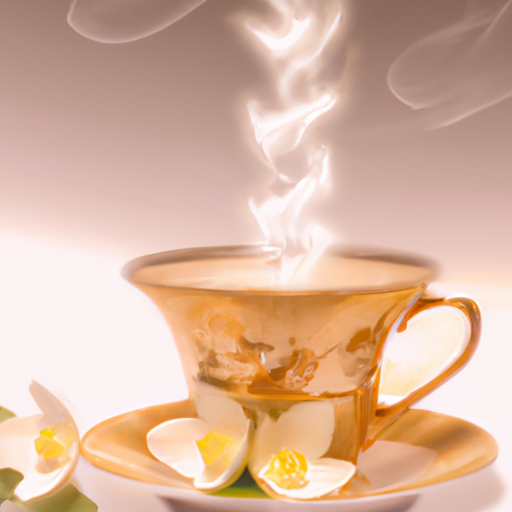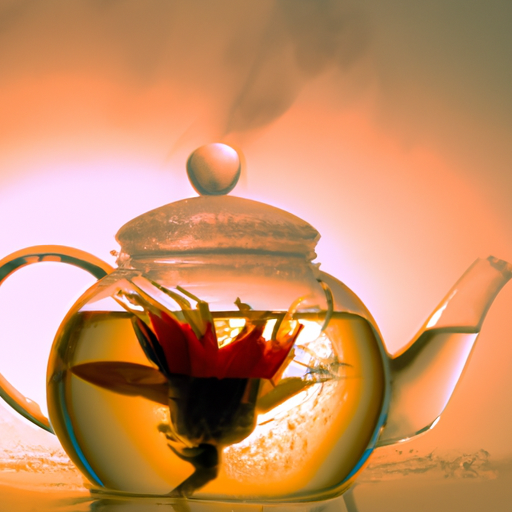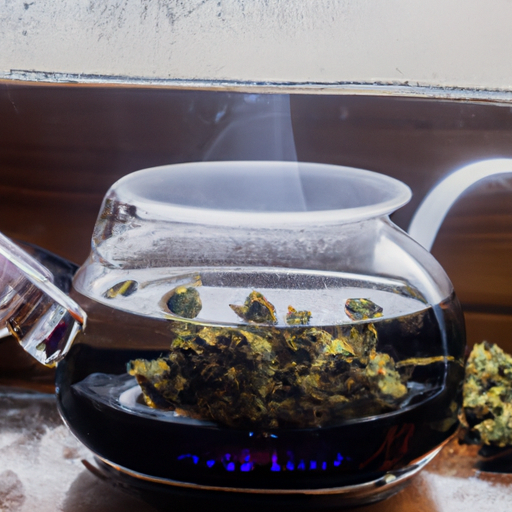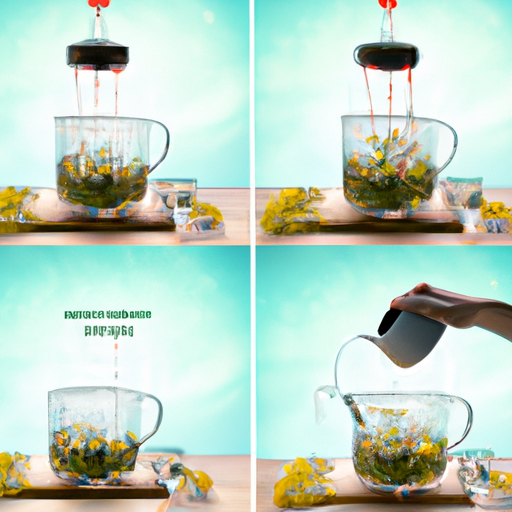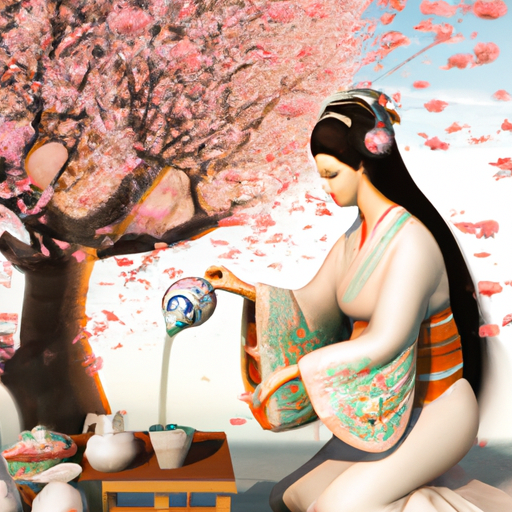As I sit here sipping on a warm, fragrant cup of jasmine tea, I can’t help but be reminded of the beautiful symbolism behind this exquisite beverage. The delicate jasmine flower, known for its intoxicating aroma, has long been cherished for its therapeutic properties and enchanting allure.
But what exactly is the role of the jasmine flower in the world of tea?
Jasmine tea, often referred to as the ‘queen of scented teas,’ is made by blending the fragrant petals of jasmine flowers with high-quality tea leaves. This captivating combination creates a sublime infusion that not only pleases the senses but also offers a myriad of health benefits. From reducing stress and anxiety to boosting the immune system and promoting digestion, jasmine tea has been treasured for centuries for its medicinal qualities.
In this article, we will delve into the history and cultural significance of jasmine tea, explore the different types of jasmine tea available, learn how to brew the perfect cup, discover the best food pairings, and explore how jasmine tea is enjoyed in various cultures.
So, join me on this aromatic journey as we unravel the secrets of the jasmine flower and its role in creating the perfect cup of tea.
Key Takeaways
- Jasmine flower petals are blended with high-quality tea leaves to make jasmine tea.
- Jasmine tea has been treasured for centuries for its medicinal properties, including stress reduction, immune system boosting, and aiding digestion.
- Jasmine tea is a symbol of purity, elegance, and hospitality in Chinese culture and is often served to guests as a sign of respect.
- Jasmine tea is used in various recipes, such as smoothies and milk tea, and can be enjoyed with light and creamy desserts.
History and Cultural Significance of Jasmine Tea
Jasmine tea, with its rich history and cultural significance, is more than just a refreshing beverage – it’s a timeless tradition that has captivated tea lovers for centuries.
The history of jasmine tea dates back to ancient China, where it was first created during the Song dynasty. The delicate jasmine flowers are handpicked and carefully mixed with green tea leaves, allowing the floral aroma to infuse into the tea. This process requires great skill and precision, passed down through generations.
In Chinese culture, jasmine tea symbolizes purity, elegance, and hospitality, often served to guests as a sign of respect. Its fragrant scent and soothing taste have made it a staple in tea ceremonies and special occasions.
Now, let’s explore the health benefits of drinking jasmine tea and how it can enhance our well-being.
Health Benefits of Drinking Jasmine Tea
Drinking this fragrant and delightful beverage can provide numerous health benefits that’ll make you feel like you’re on cloud nine. Here are some of the benefits of jasmine tea:
-
Boosts the immune system: Jasmine tea is packed with antioxidants that help strengthen the immune system and protect against diseases.
-
Improves digestion: The natural compounds in jasmine tea can aid in digestion and relieve stomach discomfort.
-
Reduces stress and anxiety: Jasmine tea is known for its calming properties, promoting relaxation and reducing stress and anxiety levels.
In addition to these health benefits, jasmine tea is also incredibly versatile and can be used in various recipes. From jasmine green tea smoothies to jasmine milk tea, the possibilities are endless.
Now let’s move on to the next section, where we’ll explore the different types of jasmine tea.
Types of Jasmine Tea
Get ready to explore the wonderful world of jasmine tea with its various types that will leave you feeling excited and ready to try them all. Jasmine tea comes in a range of flavors, each with its own unique characteristics. From delicate and floral to bold and robust, there is a jasmine tea flavor to suit every palate. Some popular types include Jasmine Dragon Pearls, which are hand-rolled tea leaves infused with jasmine flowers, and Jasmine Silver Needle, made from young tea buds and jasmine blossoms. Other varieties include Jasmine Green Tea and Jasmine Oolong Tea. These teas not only offer a delightful taste but also provide numerous health benefits, such as reducing stress, improving digestion, and boosting immunity. Now, let’s delve into the art of brewing the perfect cup of jasmine tea.
How to Brew the Perfect Cup of Jasmine Tea
To brew the perfect cup of jasmine tea, all you need is hot water, a tea infuser, and a few simple steps. Can you imagine the soothing aroma filling your kitchen as you prepare this delightful beverage?
Gently heat the water to a temperature of about 175°F.
Place the jasmine tea leaves in a tea infuser and submerge it into the hot water.
Allow the tea to steep for about 2-3 minutes to achieve the perfect balance of flavor and aroma.
Brewing techniques play a crucial role in bringing out the best in jasmine tea. The delicate floral notes and the subtle sweetness of the jasmine flowers can be easily overwhelmed if not brewed correctly. By following these steps, you can ensure that your cup of jasmine tea is fragrant and refreshing, with a perfect balance of flavors.
Now that you know how to brew the perfect cup of jasmine tea, let’s explore how this delightful beverage can be paired with a variety of foods.
Pairing Jasmine Tea with Food
Indulge in the exquisite experience of savoring the delicate flavors of jasmine tea as it harmoniously complements a wide range of culinary delights. Jasmine tea, with its fragrant aroma and floral taste, is a perfect accompaniment to various desserts. The subtle sweetness of jasmine tea pairs exceptionally well with light and creamy desserts such as vanilla custard or panna cotta. The floral notes of the tea also enhance the flavors of fruit-based desserts like lemon tart or mango sorbet. For a unique twist, try incorporating jasmine tea into your favorite dessert recipes. Infuse the tea into custards, creams, or even cake batters for a delightful floral infusion. In the table below, you can find some delectable dessert options to pair with jasmine tea:
| Dessert | Description |
|---|---|
| Vanilla Custard | Creamy custard infused with the delicate aroma of jasmine |
| Lemon Tart | Tangy lemon filling on a buttery crust, with a hint of jasmine |
| Mango Sorbet | Refreshing sorbet with the tropical flavors of mango and jasmine |
Transitioning into the subsequent section about ‘jasmine tea in different cultures’, we can explore how jasmine tea has been enjoyed in various parts of the world.
Jasmine Tea in Different Cultures
Jasmine tea holds a special place in the hearts and culture of China, Japan, and Middle Eastern countries. In China, it is a popular beverage that’s often served during special occasions and ceremonies.
Japan, on the other hand, has incorporated the fragrance of jasmine tea into their traditional tea ceremonies.
Middle Eastern countries have also embraced jasmine tea, with its delicate floral notes perfectly complementing their cuisine.
China
Explore the enchanting world of Chinese jasmine tea, where centuries of tradition and delicate floral notes await you. Jasmine flower cultivation in China dates back to the Song Dynasty, around the 13th century. The jasmine flowers used for tea are grown in the Fujian, Jiangsu, and Hunan provinces, where the climate and soil conditions are ideal for their cultivation. These flowers are hand-picked early in the morning when their fragrance is at its peak. The delicate blossoms are then mixed with high-quality green tea leaves, allowing the fragrance of the flowers to infuse the tea. This meticulous process results in a tea that is both fragrant and refreshing, with a subtly sweet taste. Transitioning to Japan, let’s discover the unique characteristics of Japanese jasmine tea.
Japan
Immerse yourself in the captivating world of Japanese tea as you savor the exquisite blend of fragrant blossoms and delicate leaves that transport your taste buds to a serene garden of flavors.
In Japan, tea is not just a beverage; it is a cherished part of Japanese traditions and culture. The art of the Japanese tea ceremony, or ‘sado,’ is a centuries-old practice that embodies grace, tranquility, and respect. The preparation and serving of tea is done with meticulous attention to detail, creating a serene and harmonious experience.
The most commonly used tea for these ceremonies is the delicate and aromatic jasmine tea, which adds a subtle floral note to the tea’s gentle flavor.
As we transition into the subsequent section about middle eastern countries, let’s explore how their tea traditions differ from those of Japan.
Middle Eastern Countries
Indulge in the rich tapestry of Middle Eastern tea traditions, where bold flavors and vibrant spices dance on your palate, taking you on a sensory journey like no other.
In Middle Eastern countries, jasmine tea production is a thriving industry. The fragrant flowers are carefully harvested and processed to create a tea that is both delicate and enchanting. The jasmine flowers are often used in traditional Middle Eastern cuisine, adding a floral note to dishes such as rice pilaf and desserts like baklava. Their intoxicating aroma and subtle sweetness make them a prized ingredient in many recipes.
Now that we’ve explored the fascinating world of Middle Eastern jasmine tea, let’s move on to where you can find high-quality jasmine tea to enjoy in the comfort of your own home.
Where to Buy High-Quality Jasmine Tea
Discover where you can find top-notch Jasmine tea by checking out specialty tea shops or reputable online retailers. When it comes to enjoying the best quality Jasmine tea, it’s important to know where to look. Specialty tea shops offer a wide selection of premium Jasmine tea, sourced from trusted suppliers who prioritize quality and flavor. These shops often have knowledgeable staff who can guide you in choosing the perfect tea to suit your taste preferences. Additionally, reputable online retailers provide a convenient option for purchasing high-quality Jasmine tea from the comfort of your own home. They offer a range of options, allowing you to compare brands and read reviews before making a decision. By exploring these avenues, you can ensure that you are getting the finest Jasmine tea to enhance your tea-drinking experience.
| SHOP | DESCRIPTION | WEBSITE |
|---|---|---|
| Tea Shop 1 | Wide selection of premium Jasmine tea | www.teashop1.com |
| Tea Shop 2 | Knowledgeable staff to guide you | www.teashop2.com |
| Tea Shop 3 | Trusted suppliers for quality | www.teashop3.com |
Frequently Asked Questions
How many different types of jasmine tea are there?
There are several different flavors of jasmine tea, each with its own unique taste. Some popular varieties include green jasmine tea, white jasmine tea, and jasmine pearl tea. Additionally, jasmine tea is known for its health benefits, such as improving digestion and reducing stress.
Can jasmine tea help with weight loss?
Jasmine tea benefits weight loss by boosting metabolism and aiding digestion. It’s a natural and refreshing drink that can be enjoyed hot or cold. Try adding jasmine tea to your daily routine with these delicious jasmine tea recipes.
What is the recommended brewing time for jasmine tea?
The recommended brewing time for jasmine tea is 3-4 minutes. This allows the delicate flavors to infuse properly without becoming bitter. It is best to drink jasmine tea in the morning or before meals to maximize its benefits.
Are there any specific foods that pair well with jasmine tea?
Jasmine tea pairs well with desserts like macarons or fruit tarts. In addition to its delightful aroma, jasmine tea offers health benefits such as reducing stress, promoting digestion, and boosting the immune system.
Are there any specific rituals or traditions associated with drinking jasmine tea in different cultures?
Jasmine tea ceremonies hold great cultural significance in various cultures. They symbolize hospitality, respect, and tranquility. From China to Japan, these rituals have been passed down for centuries, showcasing the art and beauty of jasmine tea.
Conclusion
As I sip the enchanting aroma of jasmine tea, I’m transported to a world steeped in history and cultural significance. This delicate flower has been used for centuries, not only for its beauty but also for its health benefits.
From its calming properties to its antioxidant-rich nature, jasmine tea is truly a gift from nature. Whether it’s a refreshing cup on a hot summer day or a comforting brew on a chilly evening, jasmine tea is a timeless companion that brings joy to every sip.
Explore the world of jasmine tea and let its soothing essence captivate your senses.

